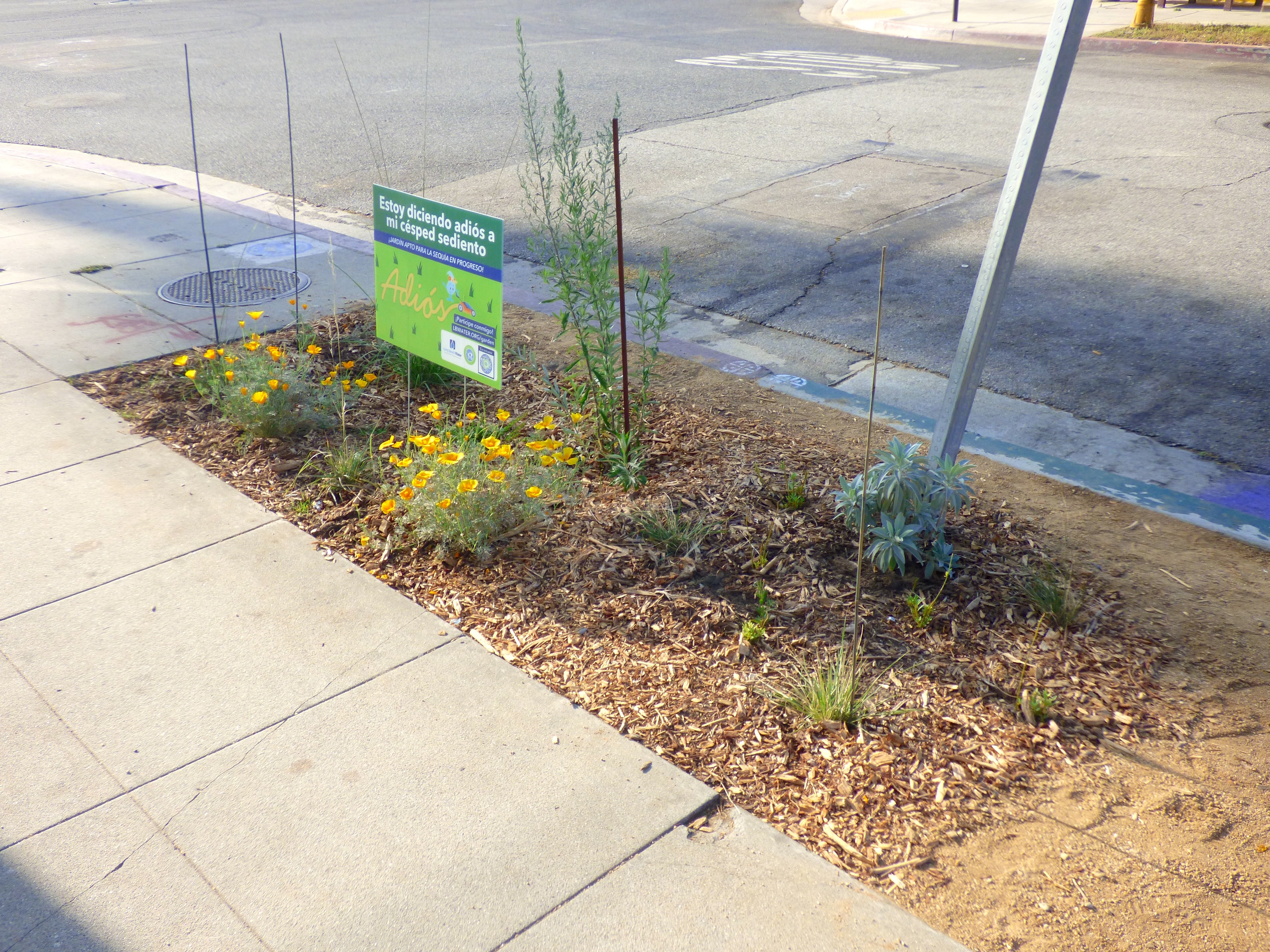
09.18.24
Long Beach, CA, Convenience Store Receives Ocean Friendly Garden Makeover
By Kathryn DressendorferHave you ever walked past a neglected planter or parkway in your neighborhood and wished it was something more?
Empty cutouts in the sidewalk that were meant to become a home to a street tree, barren street medians, and underutilized patches of dirt are so common in our urban and suburban landscapes that they often go unnoticed and unquestioned.
For Jeff Rowe, a member of the Neyham Neighborhood Association in North Long Beach, California, this place was the parkway outside of Prince Market.
Jeff Rowe, of Neyham Neighborhood Association, and the grass parkway
Prince Market, a convenience store a few blocks from his house, had a six-feet wide parkway along the side of the building, with little more than dry, brown grass and occasionally dotted with litter blown in from the busy street. Jeff helped plant a young desert willow tree in the parkway a few years ago, but he wanted to do something more.
 A monarch butterfly visits a desert willow tree at this OFG
A monarch butterfly visits a desert willow tree at this OFG
After building a relationship with the store owner, Kamal Hossin, and discussing the idea for a garden with local Tongva elder Virginia Carmelo, the vision for a project began to take shape. The reimagined parkway would feature native plants used by the indigenous people who first inhabited North Long Beach, the Tongva, and revitalize this neglected space.
Surfrider Long Beach Chapter's Ocean Friendly Gardens program leader, Kai Craig, lent his design expertise to help this new landscape protect clean water with nature-based solutions. By adding rain basins and deep-rooted native plants, this parkway will filter polluted runoff and give rain a place to soak into the ground.
The storm drain in front of the parkway and the area concrete was removed
The parkway is adjacent to a storm drain, which swiftly carries runoff and pollution to our waterways and beaches when it rains. This is a huge source of water pollution in urban environments, lowering water quality and impacting beach access and marine life.
The gutters from the convenience store roof were originally flowing onto the sidewalk and directly into the street. The Neyham Neighborhood Association helped remove 60 square feet of concrete to maximize the rainwater capture potential of the site and direct more runoff back into the ground, filtering out pollution and naturally hydrating the plants.
Removing concrete and replacing it with native plant habitat also helps reduce urban heat and the urban heat island effect, contributing to cooler, more climate-resilient neighborhoods.
 Surfrider Long Beach volunteers creating the new OFG
Surfrider Long Beach volunteers creating the new OFG
Chapter volunteers dug rain garden basins and planted a variety of California native plant species that will add vibrant blooms and restore biodiversity to this corner. The plants in the rain garden basins can tolerate flooding in the rainy season and drought in the summer, making this green space both resilient and practical.
The grass removed needed weekly mowing with lawnmowers and blowers, but the new landscaping will be much less energy-intensive to maintain. Gas-powered lawn mowers, blowers, trimmers, and hedgers in the U.S. release over 20 million tons of carbon dioxide and six million tons of toxic air pollution every year, and gardeners spill 17 million gallons of fuel a year just in refueling these tools.
The new Ocean Friendly Garden looks great, and our volunteers knocked it out of the park once again! We are excited to watch this garden grow, bloom, and soak up rain during the coming winter.

White sage, monkey flowers, and California poppies add color and resilient roots
This project was made possible with generous support from Accelerate Resilience L.A., a sponsored project of Rockefeller Philanthropy Advisors.
Want to take action? Learn more about Surfrider's Ocean Friendly Gardens program, volunteer with your local chapter to create OFG impact in your community, or support our work by becoming a member.










